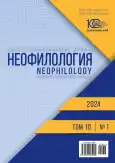The lake’s image in the artistic worldview of the Northern text of Russian literature for children
- Authors: Davydova A.V.1
-
Affiliations:
- Northern (Arctic) Federal University
- Issue: Vol 10, No 1 (2024)
- Pages: 128-137
- Section: RUSSIAN LITERATURE AND LITERATURE OF PEOPLES OF RUSSIAN FEDERATION
- URL: https://journal-vniispk.ru/2587-6953/article/view/295571
- DOI: https://doi.org/10.20310/2587-6953-2024-10-1-128-137
- ID: 295571
Cite item
Full Text
Abstract
INTRODUCTION. For the first time, the works of the Northern Text of Russian literature for children, in which the lake’s image arises, are systematized. The purpose of the study is to consider the artistic and semantic features of the leitmotif image of the lake in the context of the specifics of the artistic world of the North. The objectives of the research are to identify the main mythopoetic and realistic characteristics of the lake’s image in the works of the Northern text for children; to determine the motives and images with which it interacts as a structural element of the Northern text, to identify the place of the lake’s image in the artistic worldview of the North.MATERIALS AND METHODS. Using a systematic approach to the literary text, which is a set of methods (chronotopic, motivic, mythopoetic, systemic-semantic) that reveal the object as a single system, the lake’s image in the works of writers of the second half of the 20th century is considered: A. Linevsky, A. Petukhov, V. Pikul, M. Skorokhodov, A. Chlenov.RESULTS AND DISCUSSION. After analyzing the artistic material, it is concluded that there are two variants of the lake ’s image: tundra and forest lakes. The first is realized through the mythologeme of the circle and the personification method, the second through the motives of the two worlds, secrets, boundaries, changes of the hero. The lake’s image in the Northern text of Russian literature for children also approaches the images of the sea and the river and actualizes the motif of the unity of the world.CONCLUSION. This study is a particular stage in the study of the figurative-semantic structure of the Northern text of Russian literature for children as a supertext and indicates broad prospects for its further study.
About the authors
A. V. Davydova
Northern (Arctic) Federal University
Author for correspondence.
Email: a.davidova@narfu.ru
ORCID iD: 0000-0003-1702-0019
PhD (Philology), Associate Professor of Literature, Higher School of Social and Humanities and International Communication Department
17 Severnaya Dvina Emb., Arkhangelsk, 163002, Russian FederationReferences
- Kur’yanov S.O. Ponyatie Krymskogo mifa kak osnova Krymskogo teksta [The concept of the Crimean myth as the basis of the Crimean text]. Voprosy russkoi literatury [Questions of Russian literature], 2014, no. 27 (84), pp. 189-203. (In Russ.) https://elibrary.ru/wjxmhb
- Kur’yanov S.O. Krymskii test kak literaturovedcheskii fenomen [The Crimean Test as a literary phenomenon]. Voprosy russkoi literatury [Questions of Russian literature], 2014, no. 29 (86), pp. 176-185. (In Russ.) https://elibrary.ru/wjtksv
- Tyupa V.I. Siberia mythology: to the question of the “Siberian text” of Russian literature. Sibirskii filologi-cheskii zhurnal = Siberian Journal of Philology, 2002, no. 1, pp. 28-35. (In Russ.) https://elibrary.ru/ybsllf
- Zubtsova Yu.O. Kavkazskii tekst v literature novogo veka [The Caucasian text in the literature of the New Cen-tury]. Russkii yazyk i mezhkul’turnaya kommunikatsiya [Russian Language and Intercultural Communication], 2018, no. 1 (17), pp. 122-126. (In Russ.) https://elibrary.ru/gtvwgs
- Shul’zhenko V.I. Sovremennoe kavkazskoe literaturovedenie: gabitusy P. Burd’e i geokul’turnoe samosoznanie [Modern Caucasian Literary Studies: P. Bourdieu’s Habitus and Geocultural Self-awareness]. Materialy nauch-no-metodicheskikh chtenii «Universitetskie chteniya – 2016» [Proceedings of Scientific and Methodical Read-ings “University Readings – 2016”]. Pyatigorsk, Pyatigorsk State Linguistic University Publ., 2016, pp. 50-57. (In Russ.)
- Pospelova O.V. The image of the midnight sun in the literary works about the Russian North by A. Remizov, M. Prishvin, and E. Zamyatin. Vestnik Severnogo (Arkticheskogo) federal’nogo universiteta. Seriya: Gumanitarnye i sotsial’nye nauki = Vestnik of Northern (Arctic) Federal University. Series: Humanitarian and Social Sciences, 2017, no. 2, pp. 131-136. (In Russ.) https://doi.org/10.17238/issn2227-6564.2017.2.131, https://elibrary.ru/ykorxv
- Matonin V.N. The images of “motion” and “purpose” in Northen text of the Russian culture. Istoricheskaya i sotsial’no-obrazovatel’naya mysl’ = Historical and Social Educational Idea, 2013, no. 6, pp. 221-223. (In Russ.) https://elibrary.ru/scvskp
- Mitrofanova A.A. Intertekst Severnogo teksta [The intertext of the Northern text]. Sbornik nauchnykh statei «Geokul’turnoe prostranstvo Evropeiskogo Severa: genezis, struktura, semantika» [Collection od Scientific Articles “The geocultural space of the European North: genesis, structure, semantics”]. Arkhangelsk,Nothern Artctic Federal University Publ., 2011, pp. 412-421. (In Russ.) https://elibrary.ru/yluxth
- Petrov A.V. Toponimy kak vyrazitel’noe sredstvo v Severnom tekste [Toponyms as an expressive means in the Northern text]. Filologicheskaya regionalistika = Philological Regional Science, 2010, no. 1-2 (3-4), pp. 48-53. (In Russ.) https://elibrary.ru/vpwslr
- Loshakov A.G. Sverkhtekst i Severnyi tekst russkoi literatury [The supertext and the Northern text of Russian literature]. Severnyi tekst kak logosnaya forma bytiya Russkogo [The Northern Text as a Pulmonary Form of Being of the Russian North]. Arkhangelsk, Imidzh-Press Press., 2017, vol. 1, pp. 26-57. (In Russ.) https://elibrary.ru/xpyudb
- Galimova E.Sh. Severnyi tekst russkoi literatury: metodologiya issledovaniya [The Northern Text of Russian literature: research methodology]. Severnyi tekst kak logosnaya forma bytiya Russkogo [The Northern Text as a Pulmonary Form of Being of the Russian North]. Arkhangelsk, Imidzh-Press Press., 2017, vol. 1, pp. 9-26. (In Russ.) https://elibrary.ru/urwwbc
Supplementary files









